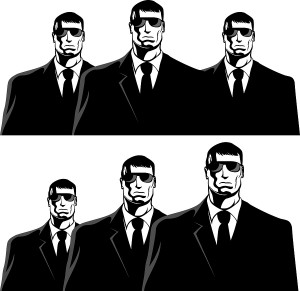EDUCATION, CERTIFICATION, & LICENSING
Many bodyguards are former police officers, ex-military, secret service agents, FBI agents, and security guards. Most agencies hiring bodyguards require a high school diploma or GED. They also screen applicants–conducting extensive background investigations and credit checks. In addition, most bodyguards must pass a health examination and drug tests.
While no national certification or licensing is needed to become a bodyguard, many clients prefer bodyguards who have attended one of several specialized training courses or “bodyguard schools” that offer certification as a personal protection specialist. Other clients look for certification proving specific skills as CPR and self-defense. Still other clients prefer bodyguards with an extensive background in police work or who are licensed to carry firearms.
Specific tasks include:
- Planning a client’s arrivals and departures throughout the day to minimize risks
- Handling paparazzi, media, and friendly approaches from fans
- Providing defensive escort driving to escape fans, paparazzi, or pursuers
- Engaging in unarmed defensive tactics to thwart aggressive fans
- Conducting home, office, vehicle, and building searches
- Protecting clients in crowd situations
- Making logistical arrangements for any trip outside the home or office
Voluntary certification in physical security and as a protection professional is available from the American Society of Industrial Security.


In my neck of the woods, wannabes and pretenders are the norm, I’m sorry to say. With clients who want EP for cheap and companies ever willing to cut corners, I’m not convinced that the industry can clean up its own act.
I still resist the idea of government-mandated anything. In the end, the ball is always in the clients’ court: qualified candidates do exist for those with the resources and will to screen and compensate properly.
There’s just so many ways to become a bodyguard, and so many ways to acquire relevant skills and training, that the one-size-fits-all approach of a national cert makes me cringe. Especially since those serious about the craft already spend so much time and money on gear, wardrobe and training on their own.
I like the idea of a Board but just to recommend a training curriculum for Bodyguard schools so that training and skills are standarized. Having a board with the power or authority to decide who gets certified and licensed to be a bodyguard seems to intrusive to me I think will lead to goverment regualtions that are unnecessary. The way this industry is right now is such that it weeds out those “wanna b’es”. People in general know that not just anyone can be a bodyguard, because if you think about it, it takes a very special person who will put his/her life on the line for some one else as a career, much like policemen and firefighters! Not just anyone can be or become a policemen or firefighter!
Hi Vince,
Just saw your question concerning the board members of this organization and thought I would provide some more information regarding its members and have included the website. As explained many if not all members of this board have alreday cut their teeth for years in this industry and understand the need for some type of professional certification or standardization across the board. Each of them have a profile/bio on the website.
Chair
David L. Johnson
Vice Chair
Edward Bailor
Board Members:
Mark E. Garver
Michael C. Cava
Robert E. Colliver
Clint Hilbert
Michael E. Nossaman
Jim Floyd
Tony Scotti
Marc E. Glasser
Gerald A. Cavis
Dennis C. D’Alessio
Michael S. LoFaso
Howard L. Weisman
http://www.abchs.com/
I think it will be great to get standardized licensing, certifications, and training for those in the close protection field and will make it legally even still harder to work this profession as it is here in the State of Georgia for these reasons. 1) This will ensure that the clients are getting quality personnel for their safety concerns. 2) It will show a separation between those who are striving to be true professionals and “buddyguards.” 3) It will bring a level of respect to the industry that is much needed, from Certified Peace Officers and those who have the “Guy with shades and arms folded across his chest” perception about what we do and look down their noses at us. 4) Lastly, those pretenders who really don’t take the craft seriously will very quickly fall to the wayside because of lack of committment. My only concern related to what Jack commented on is who will comprise this “board.” I think it should be made up of those who have proven themselves in the trenches and can comprise curriculum and testing according to real life situations.
Just a comment in response to your article concerning training. At this time a board has formed under the American Board for Certification in Homeland security (American Board for Certification in Dignitary and Executive Protection) this board has many big names associated with the industry and has approved a formal job task list to implement and develop an exam for certification. It will be ANSI approved much like the ASIS certifications and should be available in June.